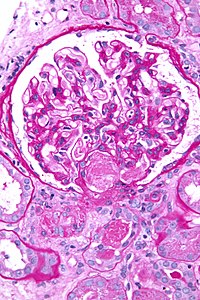
Photo from wikipedia
SERPINE1/PAI-1 is elevated in the colon tissue of the most difficult-to-treat patients with IBD and leads to worsening of experimental colitis. A punch to the gut by PAI-1 Only a… Click to show full abstract
SERPINE1/PAI-1 is elevated in the colon tissue of the most difficult-to-treat patients with IBD and leads to worsening of experimental colitis. A punch to the gut by PAI-1 Only a fraction of patients with inflammatory bowel disease (IBD) respond to therapy. To look for pathways that could distinguish difficult-to-treat patients, Kaiko et al. examined transcriptomic datasets from cohorts of patients with IBD. They found that genes normally associated with the coagulation pathway were increased in those with severe disease. These genes intersected clusters of inflammatory myeloid cells and epithelial cells, two cell types that closely interact. One player of the coagulation pathway, PAI-1, exacerbated mucosal damage in mouse colitis models. Pharmacologic inhibition of PAI-1 alleviated symptoms in these models. Their results highlight this previously unappreciated axis in mucosal wounding in IBD and could open up new avenues of treatment for patients refractory to other biologics. There is a major unmet clinical need to identify pathways in inflammatory bowel disease (IBD) to classify patient disease activity, stratify patients that will benefit from targeted therapies such as anti–tumor necrosis factor (TNF), and identify new therapeutic targets. In this study, we conducted global transcriptome analysis to identify IBD-related pathways using colon biopsies, which highlighted the coagulation gene pathway as one of the most enriched gene sets in patients with IBD. Using this gene-network analysis across 14 independent cohorts and 1800 intestinal biopsies, we found that, among the coagulation pathway genes, plasminogen activator inhibitor-1 (PAI-1) expression was highly enriched in active disease and in patients with IBD who did not respond to anti-TNF biologic therapy and that PAI-1 is a key link between the epithelium and inflammation. Functionally, PAI-1 and its direct target, the fibrinolytic protease tissue plasminogen activator (tPA), played an important role in regulating intestinal inflammation. Intestinal epithelial cells produced tPA, which was protective against chemical and mechanical-mediated colonic injury in mice. In contrast, PAI-1 exacerbated mucosal damage by blocking tPA-mediated cleavage and activation of anti-inflammatory TGF-β, whereas the inhibition of PAI-1 reduced both mucosal damage and inflammation. This study identifies an immune-coagulation gene axis in IBD where elevated PAI-1 may contribute to more aggressive disease.
Journal Title: Science Translational Medicine
Year Published: 2019
Link to full text (if available)
Share on Social Media: Sign Up to like & get
recommendations!